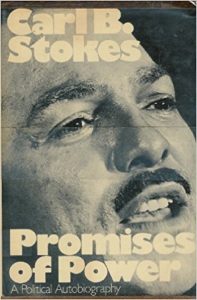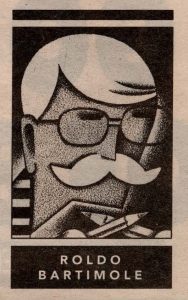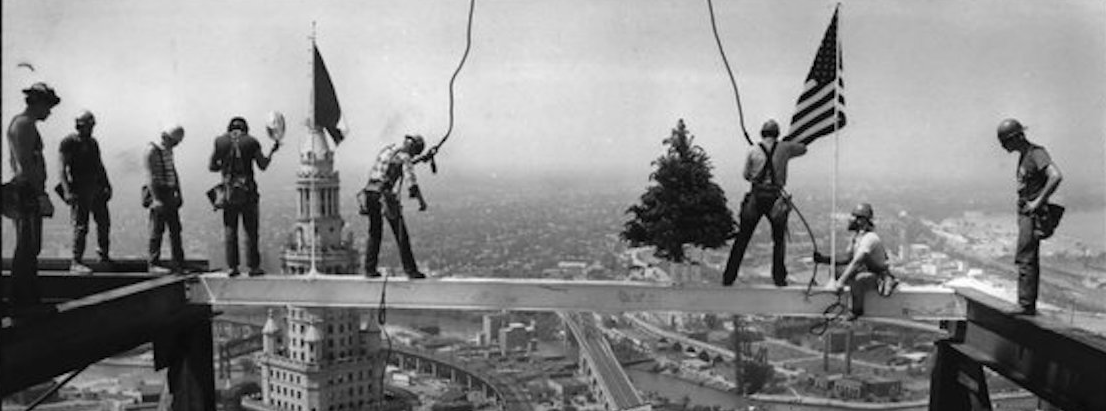CARL STOKES —PROMISES NOW SADLY FADED
July 10th, 2017

We are getting close to the 50th anniversary of the election of Carl Stokes as the first black mayor of a major American city. It’s hard to imagine that so much time has passed.
We need the thrust of those days of dissent against the imbalance of today’s Cleveland. The difference we endure between prosperity and despair.
The first time I met Carl Stokes must have been in 1965, my first year at the Plain Dealer. I was a general assignment reporter and had to cover an event where Stokes was appearing. It was, I remember a Sunday and likely the reason I got the assignment. I talked with him before or after his meeting. I don’t remember any content, but 50 years does that to you.
I do remember the impression he left. The first impression of Carl Stokes remains clear 50 years on. Here was a man who didn’t like reporters. Likely didn’t trust them. His manner sent the message.
I can’t tell you what he said. I only remember the cool manner. I talked to him only a few minutes. It was all very perfunctory. The man was going to run for mayor and he should be covered. I guess that was the reason anyone was assigned to him that day.
I’m sure he had his reasons for disliking reporters.
He made it clear many times.
He once said at a press conference, “There is hardly a place in this community where two or more persons join that their disgust in the two newspapers is not expressed. Rich people, poor people, black and white people. There is a serious erosion of confidence in the truthfulness, the integrity and the sincerity of the newspapers. And yet, what recourse do the people have as a source of news? None, really.”
A lot of people agreed with that. I do with experience from inside. That is why I’ve used that quote more than once or twice.
Carl Stokes was the best politician I ever covered. He had charm. He had great political instincts. He carried himself with confidence and distinction. And good looks never left him. Never hurt him either.
He decided not to run for a third term, in my opinion, because he had become sick of the Cleveland plutocracy. His press secretary Dick Murway told me that bluntly. Stokes, he said, was tired of being their “house nigger.”
He had had it with the racism and in particular with the corporate community. Business interests after his election ran a full-page ad in the Wall Street Journal. It was putting a brave face on its nervousness in having the first black mayor of a major U. S. city at a time of civil unrest. The ad bragged of an old blue chip city having bright new leadership.
In 1989 Fortune magazine described how Cleveland’s corporate leaders engineered a coup by dumping Mayor Dennis Kucinich. It was only the start of a takeover of city government. It has become the model for control and dominance. Limited to specific prized areas of the city.
Mayor Frank Jackson, now seeking a fourth term, comfortably represents the present Cleveland establishment. He totally lacks the political instincts of a Stokes. But this is an amazingly different time in Cleveland. Instead of civil rights and uprisings with hope, we have sporadic convulsions fed by a depressing succession of social disease caused by poverty and the lack of concern that spurred actions in the 1960s. We have a community illness lacking a spark of hope. Hopelessness breeds social disintegration. This may be Jackson’s legacy. His and corporate fear is that resistance has taken hold.
That’s why Jackson has begun to act as if he cares. And corporate interests are starting to strike back. Out of fear. It may be too late for them. Many citizens see the duplicity.
A first sign has been the formation of a church grouping to draw attention to a number of social issues that have gone unattended here. This is a crucial event. The latest attack against the groups indicates this realization. It was noticed. Not with pleasure.
The media play of the four of 43 religious organizations that left the Greater Cleveland Congregations organization because of its opposition to a multi-million gift to Dan Gilbert has the smell of Cleveland corporate politics at work. No one could convince me this isn’t Jackson/corporates string pulling. No doubt the PD won’t examine the elites and connections of the four dissenting church groups. The media will let it ride.
But it is the most relevant action in years.
In 1968, a kind of payoff program run by some business leaders—paying black militants to keep peace during Stokes’ primary run—provided resources that led to the purchase of guns used in the 1968 Glenville shootout with police.
That ended any real cooperation with Stokes from the business people.
Stokes wrote about the establishment in his Promises of Power, a perfect title for his political career.
He related his experience with the established corporates in his memoir of the times:
In the Spring and Summer of 1967, when the same power structure was grooming me as the man to back in the mayor’s race, I was invited to the most exclusive clubs in Cleveland to talk to them about myself and what I hoped to do for Cleveland. It became clear after a couple of these lunches that these men had two things on their minds—the fear of another riot and the possibility of an alliance between Stokes and Cyrus Eaton.
Eaton was an unconventional corporate leader and a worry to Cleveland’s top business leadership. When I started Point Of Viəw in 1968 there was a silly rumor that he was financing me. Never met him. I never heard from him.
Stokes said one thing he learned from Eaton a Cleveland unwritten code. It was unstated “but hard as a rigid fist—against getting involved publicly on issues. That is the rule for the power structure, the business community, those very private men at the top of our businesses and industries. They couldn’t afford to fight Eaton in the public area because they do too many things the public must not know; their deceptions, their intrigues, their dealings with each other must remain private.”
Quite a telling truism. Backed by experience.
Of course, you could never forget the problems Stokes had with the Cleveland police. They refused to accept a black mayor. He blamed the media, particularly the Plain Dealer, for allowing the police to spew hatred. The Western Reserve University Civil Violence Center labeled the PD effort as “effectively keeping the vendetta going between the races.”
Calling the police department “blatantly anti-Stokes” in his book, he charged the PD with permitting them “to spew out their hostilities toward me on the front page.” (I remember writing that what the PD did was “print the ugly rumor from fact,” while promising to separate “ugly rumor from fact.” Chief among the PD reporters was Doris O’Donnell, a favorite of the cops.)
However, the police remained a significant problem for Stokes.
There is a police-corporate connection via Bluecoats. Wealthy Bluecoat donors provide help to officer’s families if killed on duty. At one Bluecoat meeting Fred Crawford, boss of TRW, Inc. made a racial joke about Stokes. The PD reporter cited it in his coverage but it was removed before publication. Someone sent the original copy to me and it appeared in POV.
Stokes may have thought he had a surprising solution. He believed he had found an answer in Gen. Benjamin Davis. Davis was retiring as an Air Force three star general. (He got a 4th star from President Bill Clinton). Stokes had had trouble with naming a Safety Director. So Stokes met with him secretly and asked him to come to Cleveland as Safety Director. The police would have to respect him, thought Stokes. He writes that he allowed himself “to be carried into the greatest personal debacle of my career.”
However, I believe the result revealed Stokes’s incredible political talent when his choice became a critical mistake. Davis was loved by the police and by the Cleveland business and media establishments. They thought of him as Stokes’s replacement.
I put the Davis situation in clear, simple language, noting that he was supposed to “bridge the gap between the police and the Stokes Administration.”
But I noted instead, “He joined the cops.”
Stokes put it another way in his book, “Jim Stanton (Stokes bitter rival and Council President) love him, the newspapers loved him, the white community loved him. And … the police fell madly in love with him.”
It didn’t work that way.
Davis, apparently taken by all the adulation he was receiving, struck at Stokes in a devastating way.
He wrote a letter of resignation, claiming Stokes was supporting “enemies of law enforcement.”
The hit was where Stokes was most vulnerable—on community safety.
“I find it necessary and desirable to resign as director of public safety,” Davis wrote in a letter to Stokes.
“The reasons are simple: I am not receiving from you and your administration the support my programs require. And the enemies of law enforcement continue to receive support and comfort from you and your administration. I request your acceptance of my resignation at your earliest convenience.”
It was a news bombshell. It became a news media frenzy.
I wrote at the time that Tom Guthrie, an assistant to PD publisher Tom Vail and someone reporters felt was intolerant of blacks, rarely wrote anything. But here he couldn’t resist, blessing Davis with “absolute integrity.” He apparently learned this reporting that Davis’s golf shots were “right down the middle,” revealing himself as a golf partner of the General.
Not only did Davis say enemies of law were ascended but Stokes was supporting them.
“This damn hero,” said Stokes, “was accusing me of harboring criminals; suddenly all the racist rumor about me were confirmed,” Stokes wrote.
The charge, however, lacked political shrewdness on Davis’s part. He was a straight-laced commander, not a politician.
He excited the news media. However, he wouldn’t name any “enemies of law enforcement.” He remained silent.
Stokes, shocked by the press favorable response to the Davis charges, called upon Davis to name the names of these “enemies of the law.”
Davis stood his ground. After all, he was the General. His word was The Word.
Stokes, at a packed press conference, put out the names himself. He had gotten them privately from the General.
It blew a giant hole in the General’s and media’s damning story.
As I’ve written before the “enemies” list included the Council of Churches, the Call & Post, a black community newspaper, and a settlement house.
None were on anyone’s “wanted” list. It was a blunder by Davis, He didn’t understand Cleveland.
Stokes had set the political trap for Gen. Davis. His reluctance to name names did him in. Further, Stokes had more ammo.
At the time there had been attacks on blacks in the Tremont area. Police did little or nothing to suppress the violence. Davis ignored it. I had written about the issue two weeks before. Neither its councilman, Dennis Kucinich at the time, nor Davis moved to quell the violence.
Davis apparently thought he was headed for greater things in Cleveland.
I wrote in July 1970: “Davis began getting tacit support from parts of the media and the Democratic and Republican parties looking for a candidate in 1969.
Stokes, of course, not only survived the crisis but went on to win the election in 1969.
I had a young man in Stokes’s office that provided me with information. I was able to print that Davis tried to order 30,000 Remington 38 special, 125 grain hollow point bullets. At the City Club about this time, Davis charged that black nationalists were “out to get police and out to get us.” I then noted that it appeared he got it backwards.
After Martin Luther King, Jr. was assassinated in July of 1968, Stokes walked the streets of Cleveland. Cleveland had no rioting that night as other cities exploded.
So the corporate community joined with Stokes in a program supposedly to attend to some of the urban problems. It was called Cleveland Now but was not heavily funded. The media played it up as a serious attack on poverty. It was a phony program.
In 1993 I was given a celebratory night marking 25 years of publishing the newsletter. I walked in and could see Carl Stokes standing in front of the stage. He was reading it. The headline on Vol. 1 No. 1 was:
Cleveland Now:
another gimmick
It started:
Just ask yourself: Is the answer to the massive physical and social problems of American cities to be found in 55 cent contributions of widows, 10 cent donations of welfare children, or one hour’s wages of laborers.
Cleveland Now creates the illusion that it is. Therefore, it’s a pornographic answer to the city’s ills. It is a diversion.
I quickly walked up and said, “You don’t want to read that Carl.” He said, I believe amused, “It’s the only thing up there.”
When he left office, Stokes went off to New York City, where if you can make it there you can make it anywhere. He became an anchor at the local NBC TV station.
But he returned in the late 1970s. First to bolster Dennis Kucinich’s run against George Voinovich, the corporate darling who claimed to like “Fat Cats” and did. “I want as many in Cleveland as I can get,” he told the New York Times.
But his return had to be part of a deal. The United Auto Workers were big backers of Kucinich. The steel union became a Stokes law client. A major client he lost with a change in national union leadership.
I remember at the time meeting him on the street downtown. He invited me up to see his new offices. The office was being reconstructed.
I remember him telling me, “You didn’t think I came back to be a Councilman, did you?” Hadn’t even thought of that.
But I figured he came back to resume his place as the town’s major powerbroker, particularly in the black community. But it was too late. George Forbes had consolidated power and wasn’t about to share. Forbes had made his deal with the white Democrats and the white business community. And they with him.
He was their guy.
My personal remembrances of Stokes were mostly good.
When he was mayor WKYC-TV had televised press conferences with city hall reporters questioning Mayor Stokes. I pushed my way in. At one point Channel 3 management tried to bar me. Stokes essentially said I was in or he was out. They couldn’t so easily dismiss me, thanks to Stokes. The show went on for a time. It’s shameful that today there is no real live coverage of the mayor or the county executive. A weekly press conference would produce news.
One experience wasn’t good. That’s when he sent me a threatening letter. He threatened to sue me. I believe I know the reason. It had to do with that power thing. I ran the headline on his threat: STOKES: POV LIES [Page 3, JH].
He was right. I had inadvertently made a mistake. Indeed, I had called him about an organization I was to write about. He told me he didn’t really know much and that he wasn’t a member. His brother Lou Stokes was, he said.
When I ran the list of members I erroneously typed in both Lou and Carl Stokes. This was early 1982.
I apologized after running his entire letter of complaint. I never heard anything else about it.
I believe he was sending a shot across the bow. He worried about any criticism of him at that time, especially that someone would write negatively about him. I would have been a minor possible hazard but he knew Point Of Viəw did have limited but readership among politicians, media and corporate types.
Stokes did invite me to speak to a class he was teaching at Case-Western Reserve University. Most mayors seem to get teaching positions at local universities after serving.
Following the class with Stokes he asked me to dinner at the now gone Boarding House on Euclid near Mayfield Road. We had dinner upstairs.
When we finished and were coming down the stairs, a young black man playing pool looked up. He said, “Hey aren’t you….” and anyone could finish that sentence: “Carl Stokes, right?” But instead he continued, “Roldo?” I was recognized because The Edition, a classy alternative, used a caricature of me with a column I wrote. More people recognize me from that drawing than from any photo of me.

I couldn’t believe that Carl Stokes would go unrecognized. It didn’t upset him but it reveals how easily we forget our history.
As we left the restaurant, Stokes said something to the effect that “wouldn’t Dick Feagler make a story of that.”
Feagler was a favorite of Stokes. He could write the touchy-feely columns that just aren’t done here anymore.
I always regret that the last time I saw Stokes he was picking up something from my home. We didn’t talk long. I regret that I didn’t ask him to sit and share some time with him.
He died not long after.
By Roldo Bartimole…
The story originally ran on July 10, 2017 and the link is here
